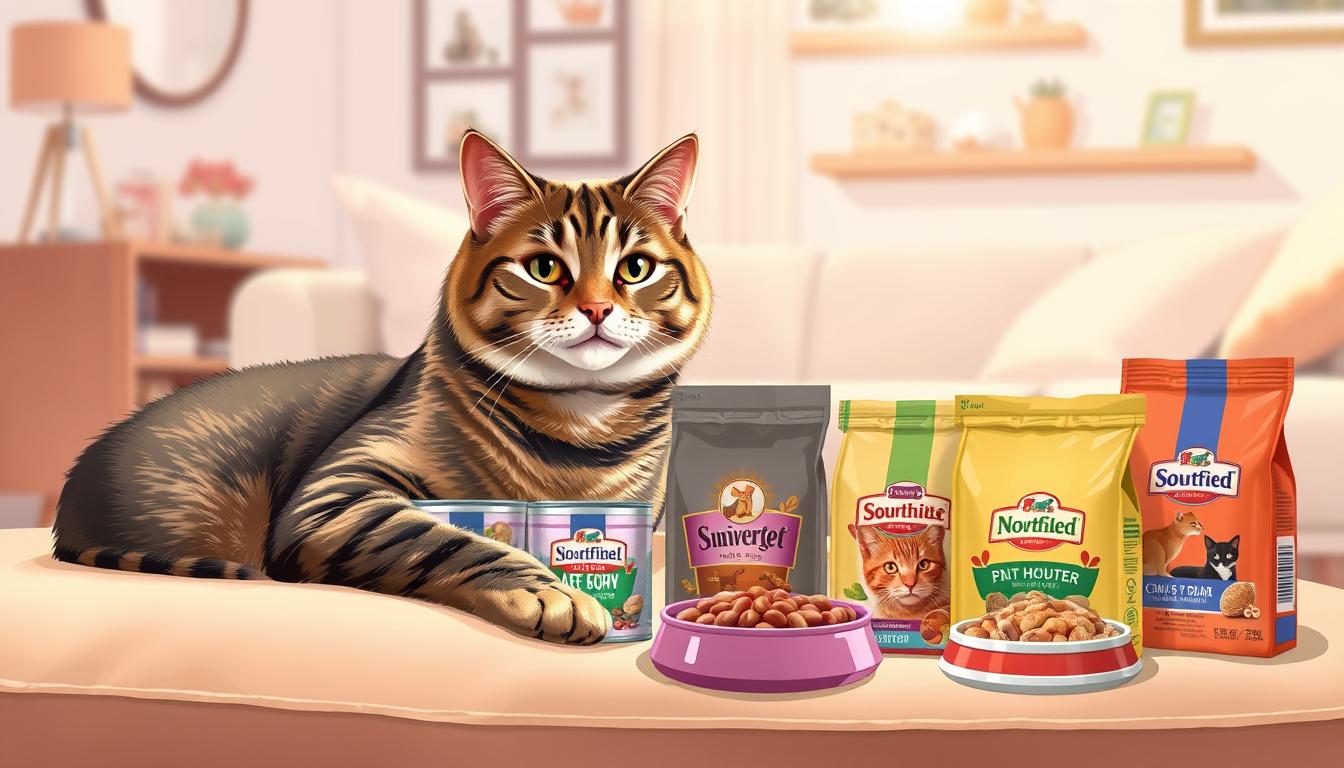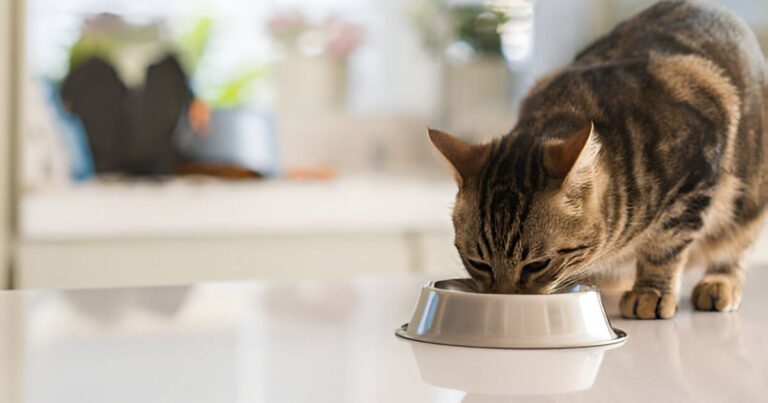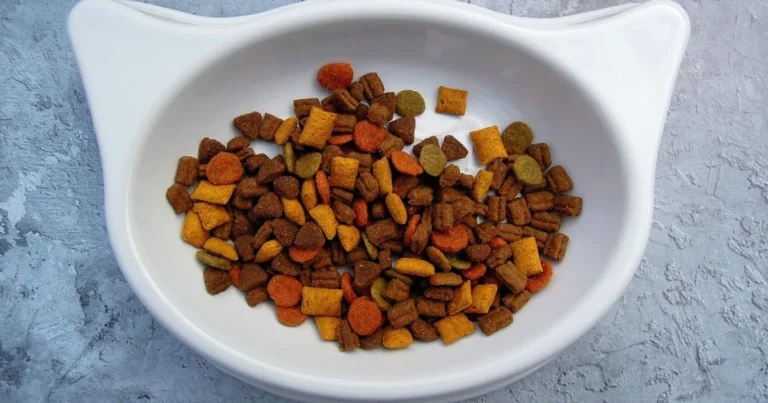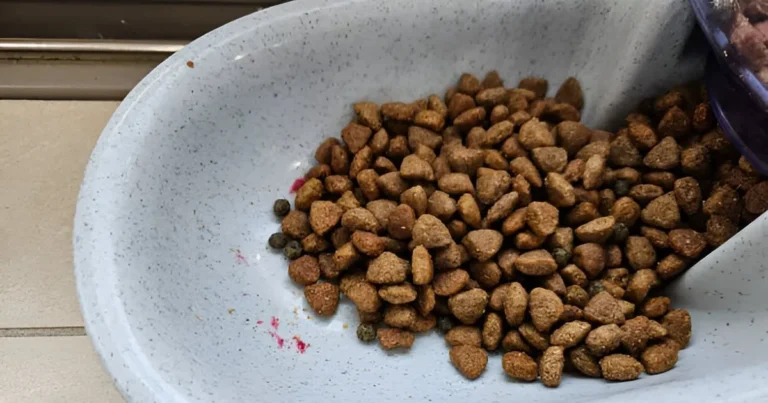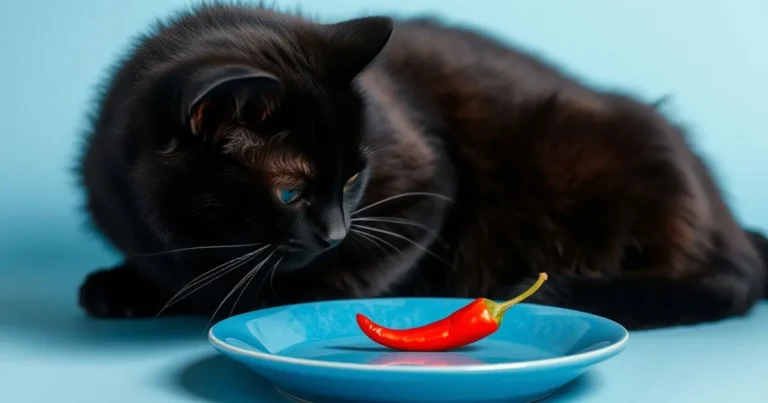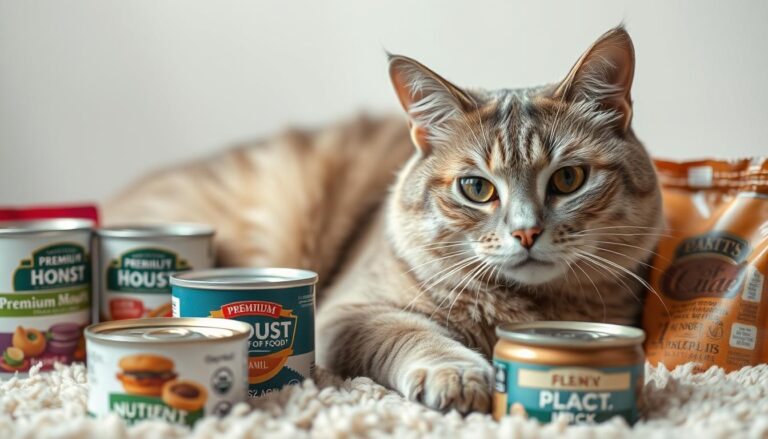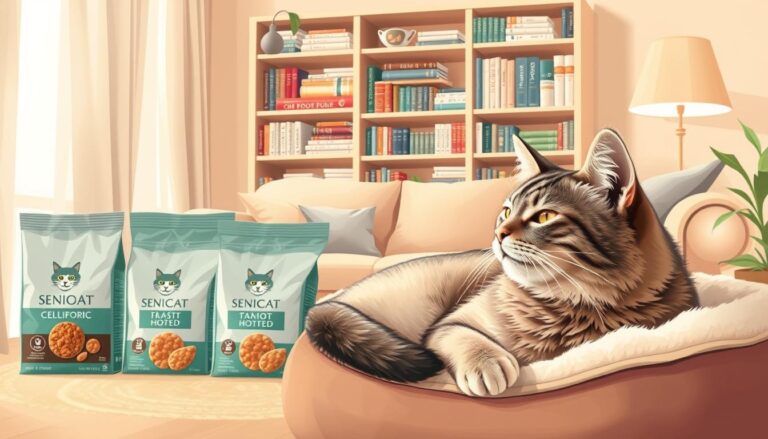Healthy & Delicious Senior Cat Food Choices
As a devoted cat parent, I remember when I realized my aging cat needed something different. Her once-vibrant energy was slowly fading. I knew her diet had to change to support her health and happiness.
Senior cats have special nutritional needs that are different from younger cats. Their metabolism, digestion, and health change with age. Choosing the right senior cat food is key to managing weight, supporting joints, and keeping muscles strong.
Understanding what older cats need isn’t just about feeding them. It’s about giving them the nourishment they need. Each bite of the right senior cat food can greatly improve your cat’s life, energy, and how long they live.
Key Takeaways
- Senior cats require specialized nutrition
- Proper diet supports overall health and wellness
- Nutritional needs change with age
- Quality ingredients matter more than ever
- Regular diet assessment is crucial
Understanding Your Senior Cat’s Nutritional Needs
As your cat gets older, their diet needs change a lot. It’s important to choose the right senior cat food to keep them healthy. Older cats have different needs than younger ones.
Cats usually become seniors between 7-10 years old. At this time, their metabolism slows down and they face more health issues. The right food can greatly improve their life quality.
Key Nutrients for Aging Cats
Older cats need a diet rich in certain nutrients:
- High-quality protein for muscle maintenance
- Lower calorie content to prevent weight gain
- Enhanced omega-3 fatty acids for joint health
- Increased antioxidants to support immune function
Age-Related Dietary Changes
As your cat ages, their diet needs to change. Their metabolism slows down, so their diet must adjust to keep them healthy.
| Age Range | Nutritional Focus | Recommended Adjustments |
|---|---|---|
| 7-10 years | Metabolism Slowdown | Reduced calorie intake |
| 10-15 years | Muscle Preservation | Increased protein quality |
| 15+ years | Digestive Support | Easier to digest nutrients |
Health Conditions That Affect Diet
Some health issues in senior cats need special diets:
- Kidney Disease: Lower phosphorus diets
- Arthritis: Anti-inflammatory nutrients
- Dental Problems: Softer food textures
- Weight Management: Controlled calorie intake
Talking to your vet can help you find the best diet for your senior cat’s health needs.
What Makes Senior Cat Food Different?
As your cat gets older, their diet needs change a lot. Senior cat food is made to meet these new needs. It helps keep your cat healthy and happy.
Senior cat food has some key changes:
- Less calories to stop cats from getting too fat
- More fiber for better digestion
- Proteins are balanced to help the kidneys
- Glucosamine is added for joint health
Older cats might eat less and have sensitive teeth. Senior cat food is softer and tastes better. It’s made to make older cats want to eat and get the nutrients they need.
Senior cat food also has:
- Less phosphorus for the kidneys
- More omega-3s for the brain
- Minerals are adjusted for better metabolism
- Easier proteins for digestion
Choosing the right senior cat food is very important for your cat’s later years. Knowing what your cat needs can help them stay active and comfortable.
Top-Rated Senior Cat Food Brands for 2024
Choosing the right senior cat food can be tough. Your cat needs food that supports their health as they age. Senior cat food reviews help find the best brands for 2024.
When picking senior cat food, look at nutrition, taste, and health benefits. Different brands meet different needs and budgets.
Premium Brand Options
Premium senior cat food has great nutrition for older cats. These foods usually include:
- Hill’s Science Diet Adult 7+ Senior Cat Food
- Royal Canin Aging 12+ Thin Slices in Gravy
- Purina Pro Plan Bright Mind Adult 7+ Chicken
Budget-Friendly Choices
Good senior cat food doesn’t have to be expensive. Many brands offer great nutrition at lower prices:
- Purina Friskies Prime Filets Senior
- Meow Mix Tender Centers Senior
- Fancy Feast Classic Senior 7+ Variety Pack
Veterinarian-Recommended Selections
Vets can help pick the best senior cat food. They know which brands meet specific health needs.
Always talk to your vet to find the best senior cat food for your cat. They’ll consider your cat’s health and diet needs.
Wet vs. Dry Senior Cat Food: Making the Right Choice
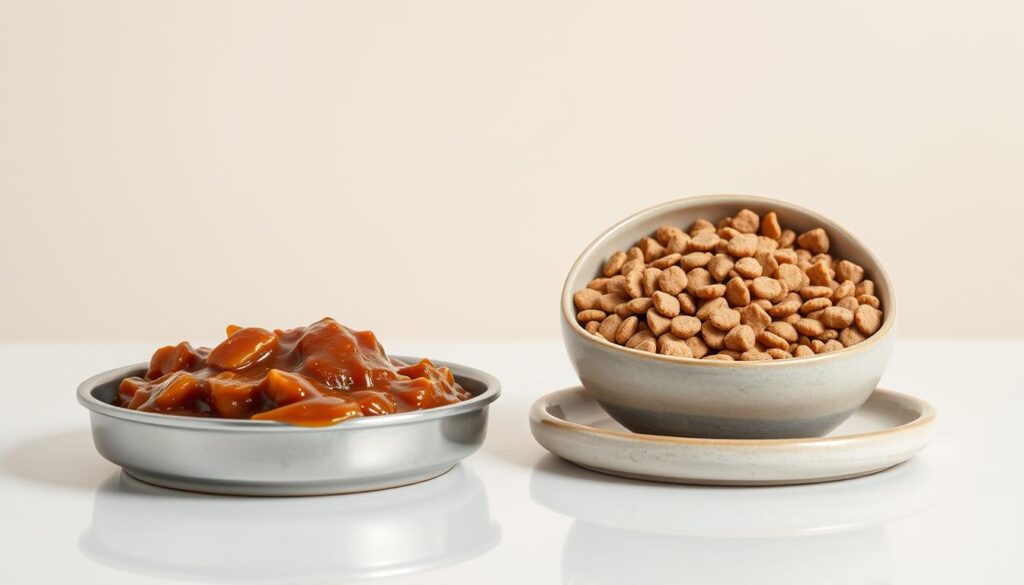
Choosing the right senior cat food can be tough. Your aging cat needs special care in their diet. You must think about wet and dry food options carefully.
Wet food is great for senior cats. It has lots of moisture, which is key as cats get older. Cats with dental problems or low appetite find it easier to eat and taste better.
- Higher moisture content
- Softer texture for cats with dental problems
- More appealing flavor
- Easier to digest
Dry food has its own perks for senior cats. It helps keep their teeth clean by reducing plaque. It’s also easy to leave out without it going bad.
| Food Type | Pros | Cons |
|---|---|---|
| Wet Food | High moisture, soft texture | More expensive, spoils quickly |
| Dry Food | Dental health, convenient | Lower moisture, potential weight gain |
Vets often suggest a mixed feeding approach for senior cats. This mix of wet and dry food ensures your cat gets the best nutrition and enjoys their meals.
When picking the best senior cat food, think about your cat’s health, likes, and your vet’s advice. Every cat is different, so what’s good for one might not be for another.
Essential Ingredients to Look for in Senior Cat Food
Choosing the right senior cat food is key for your aging cat’s health. As cats get older, their diet needs change a lot. Knowing what to look for in senior cat food can help keep your cat healthy and happy for longer.
When picking senior cat food, check the ingredients and nutrition closely. The right mix of nutrients can greatly improve your cat’s health and energy.
Protein Sources
Protein is still very important in senior cat food. Look for high-quality, easy-to-digest proteins that help keep muscles strong and overall health good:
- Lean meats like chicken or turkey
- Fish such as salmon or whitefish
- Meat-based proteins with high biological value
Beneficial Supplements
Senior cat food should have important supplements for aging cats:
- Taurine: Essential for heart and eye health
- Omega-3 fatty acids: Supports joint health and reduces inflammation
- Antioxidants: Helps boost immune system function
Ingredients to Avoid
When choosing senior cat food, avoid harmful ingredients:
- Artificial preservatives
- Excessive carbohydrate fillers
- Low-quality by-products
- Unnecessary grain additives
By picking senior cat food with quality ingredients and the right nutrients, you can help your aging cat stay healthy. This way, they can enjoy their golden years with comfort and energy.
Special Dietary Considerations for Older Cats
As your cat gets older, their diet needs change. Senior cat food must tackle health issues that come with age. Cats over 7 years old need special diets to meet their new needs.
Health problems require specific diets for older cats. Your vet can create a diet plan for your cat. This plan can help with kidney disease, diabetes, hyperthyroidism, and inflammatory bowel disease.
Nutritional adaptations are crucial for maintaining your senior cat’s quality of life. Some senior cat foods tackle many health issues at once. They offer complete nutritional support.
When picking senior cat food, look for these key things:
- Lower calorie content to prevent weight gain
- Increased protein quality
- Enhanced digestibility
- Targeted supplementation
Always talk to your vet to make a diet plan for your senior cat. Regular vet visits and diet checks keep your cat healthy and happy in their golden years.
How to Transition Your Cat to Senior Cat Food
Switching your aging feline to the best senior cat food needs patience and a smart plan. This change is key to keeping your cat healthy. It ensures they get the right food for their age.
Choosing the right senior cat food is important. A slow transition helps avoid stomach problems. It also makes it more likely your cat will like the new food.
Transition Timeline
Here’s how to introduce new senior cat food:
- Days 1-3: Mix 25% new food with 75% original food
- Days 4-6: Blend 50% new and 50% original food
- Days 7-9: Combine 75% new food with 25% original food
- Day 10: Completely switch to new senior cat food
Signs of Food Acceptance
Look for these signs that your cat is doing well:
- Consistent eating patterns
- Normal energy levels
- Regular bathroom habits
- No visible digestive discomfort
Common Adjustment Issues
Some cats face challenges when trying new senior cat food. If your cat is still not eating or has stomach issues, see your vet. Problems can include less appetite, soft stools, or mild vomiting.
Pro tip: Warm the new food slightly to enhance its aroma and make it more appealing to your senior cat.
Common Feeding Mistakes to Avoid
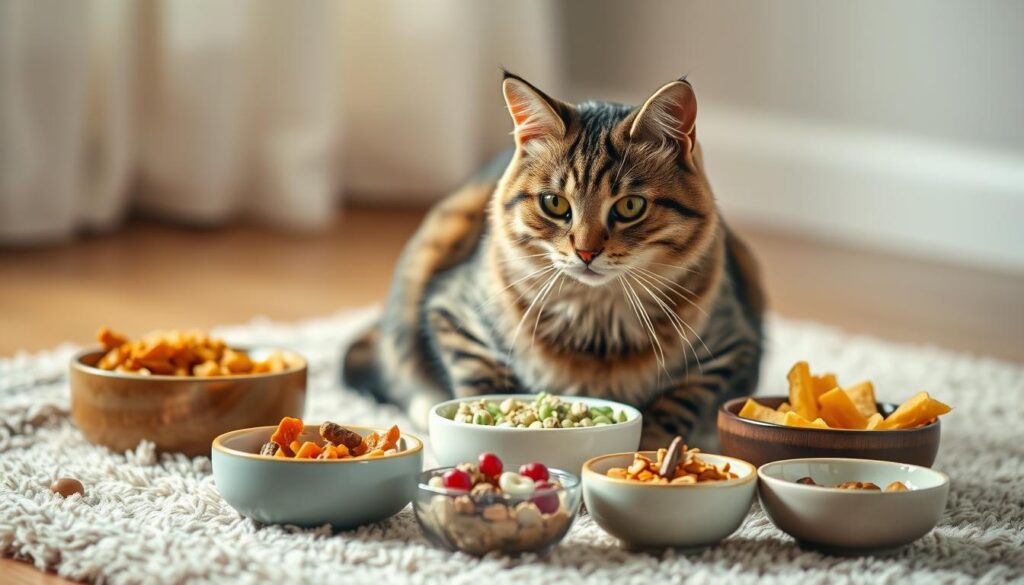
Caring for an aging cat is all about their nutrition. Many pet owners make big mistakes when choosing and feeding senior cat food. These mistakes can harm their cat’s health.
Here are some common feeding mistakes to avoid:
- Neglecting portion control: Older cats have slower metabolisms and require fewer calories
- Ignoring individual health requirements when choosing senior cat food
- Continuing to feed the same amount as when your cat was younger
- Overlooking potential medication interactions with affordable senior cat food
As your cat ages, portion sizes become key. Decreased activity levels mean your senior cat burns fewer calories. This makes overfeeding a big risk. Talk to your vet to find out what your cat really needs.
When picking senior cat food, remember not all is equal. Look for food that:
- Addresses specific age-related health concerns
- Provides the right amount of protein
- Has ingredients that are easy to digest
- Offers balanced nutrition for senior cats
Pro tip: Regular vet visits can help you adjust your senior cat’s diet and avoid nutritional mistakes.
Affordable senior cat food doesn’t mean you have to sacrifice quality. Look for brands that offer complete meals for older cats. They should balance cost with essential nutrients.
Monitoring Your Senior Cat’s Health and Adjusting Their Diet
Watching your senior cat’s health closely is key to their happiness. It’s not just about picking the right food. It’s also about observing and managing their diet well.
Regular health checks are important. They help you make the right food choices and make changes as needed:
- Weight management and body condition
- Coat and skin health
- Energy levels and activity
- Litter box habits
- Overall appetite and eating patterns
Your vet can set a health baseline for your senior cat. Regular weigh-ins are crucial to keep them at a healthy weight. Big changes in weight could mean health problems that need diet changes.
| Health Indicator | What to Watch | Potential Dietary Action |
|---|---|---|
| Weight Changes | Sudden loss or gain | Adjust calorie intake or switch to specialized senior formula |
| Coat Quality | Dull or patchy fur | Consider food with omega fatty acids |
| Energy Levels | Decreased activity | Evaluate protein and nutrient balance |
If you see big changes in your senior cat’s health or eating, talk to your vet. They can give you food advice that fits your cat’s needs.
Supplementing Your Senior Cat’s Diet: Do’s and Don’ts
Choosing the right supplements for your senior cat can be challenging. Your aging cat might need extra nutrients, but adding them must be done with care. The right senior cat food covers most nutritional needs, but some cats might need more.
Before adding any supplements, talk to your vet. They can spot any nutritional gaps and suggest the right supplements for your cat.
- Recommended Supplements for Senior Cats:
- Omega-3 fatty acids for joint health
- Glucosamine and chondroitin for mobility
- Probiotics for digestive support
- Vitamin B12 for energy and cognitive function
When looking at supplements, watch out for these warning signs:
| Supplement Type | Potential Benefits | Caution Indicators |
|---|---|---|
| Joint Supplements | Improved mobility | Digestive upset or allergic reactions |
| Vitamin Supplements | Enhanced nutrition | Excessive supplementation |
| Probiotics | Digestive health | Persistent digestive changes |
Pro tip: Start with small amounts of supplements and watch your cat’s reaction. The aim is to add to their diet, not replace it.
Potential risks of over-supplementation include:
- Nutrient imbalances
- Digestive issues
- Potential toxic buildup of certain vitamins
Remember, the best senior cat food should be the main source of nutrition. Supplements are for specific health needs, not a full diet.
Conclusion: Ensuring Your Senior Cat Thrives with the Right Nutrition
Choosing the right senior cat food is crucial for your aging cat’s health. It’s important to pick a food that meets their changing needs. Top brands offer special formulas for older cats, helping with health issues.
Vets say it’s key to tailor your cat’s diet as they age. Brands like Royal Canin, Hill’s Science Diet, and Purina Pro Plan are great. They help with joint health, muscle, and nutrient absorption.
Understanding your senior cat’s diet needs can greatly improve their life. Regular vet visits and watching their diet are important. It shows you care and want them to be happy and healthy.
Every cat is different, so be ready to adjust. The right food can make their golden years comfortable and full of life.

